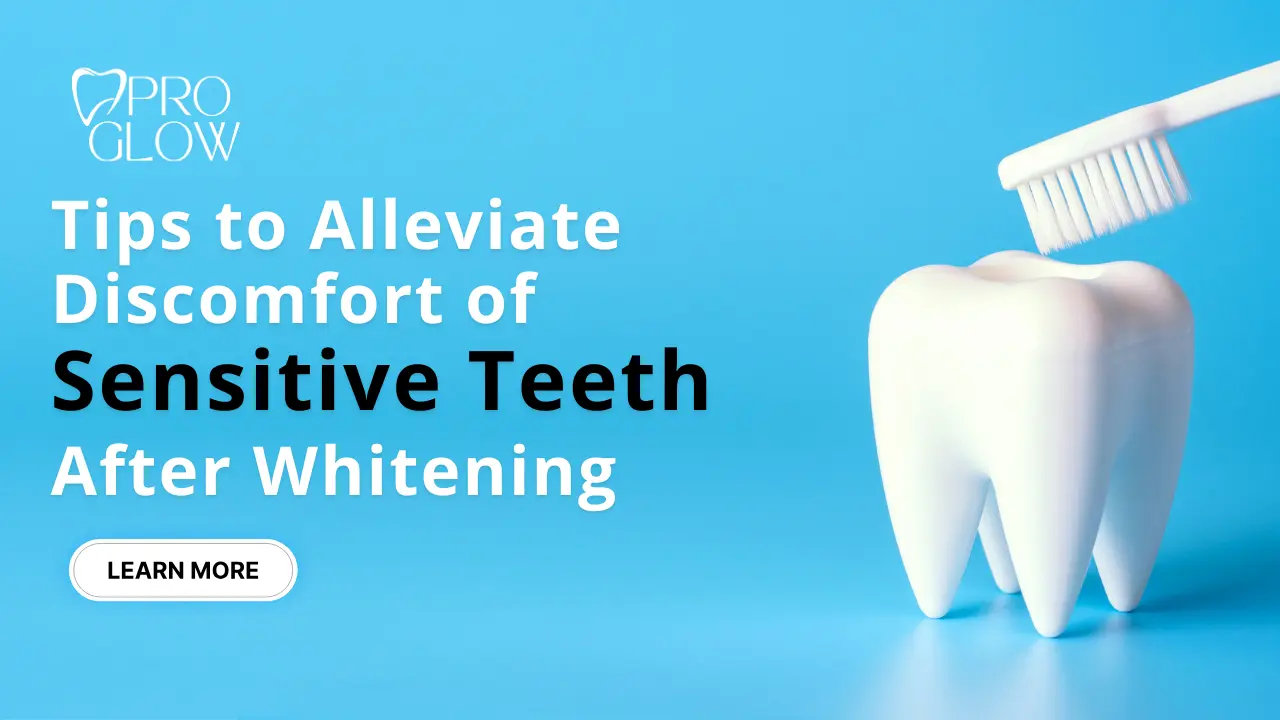November 14, 2023 admin
Tips to Alleviate Discomfort of Sensitive Teeth After Whitening

Teeth whitening has become a popular cosmetic procedure, promising a radiant, confident smile. However, the journey to pearly whites isn’t always painless. Many individuals experience sensitivity after an initial teeth whitening treatment, which can be uncomfortable and, at times, discouraging. In this blog post, we’ll delve into the reasons behind sensitive teeth post-whitening and share valuable tips to help you alleviate discomfort and enjoy the benefits of a brighter smile.
Understanding Teeth Sensitivity
Explaining tooth sensitivity
Tooth sensitivity is a common issue that arises when the protective enamel of the teeth is compromised, exposing the dentin underneath. Dentin contains tiny tubules that lead to the nerve endings of the tooth. When these tubules are exposed, stimuli like hot, cold, sweet, or acidic substances can cause discomfort.
Causes of sensitivity post-whitening
Teeth whitening products, especially those with high concentrations of bleaching agents like hydrogen peroxide or carbamide peroxide, can contribute to sensitivity. The bleaching process temporarily opens the tubules in the dentin, making the nerves more susceptible to external stimuli. Additionally, improper use of whitening trays or strips, such as leaving them on for extended periods, can increase sensitivity.
Importance of addressing the issue
While tooth sensitivity after initial teeth whitening treatment is usually temporary, ignoring the issue can lead to long-term discomfort and might discourage individuals from pursuing future whitening treatments. It’s essential to understand the causes and take steps to alleviate sensitivity for a more pleasant whitening experience.
Tips for Alleviating Discomfort
Choosing the right whitening products
Opt for whitening products with lower concentrations of bleaching agents. While they may take longer to show results, they are gentler on your teeth and can significantly reduce post-whitening sensitivity.
Gradual whitening approach
Consider a gradual approach to teeth whitening. Instead of intense, one-time sessions, choose a whitening routine that allows your teeth to adapt slowly. This can minimize sensitivity and still provide effective results.
Proper oral hygiene practices
Maintaining good oral hygiene is crucial, especially after teeth whitening. Brush your teeth with a soft-bristled toothbrush and non-abrasive toothpaste. Floss regularly to keep your gums healthy and prevent sensitivity.
Desensitizing toothpaste and mouthwash
Invest in desensitizing toothpaste and mouthwash to take care your oral health after initial teeth whitening treatment. These products contain ingredients that help block the tubules in the dentin, reducing sensitivity. Use them as part of your daily oral care routine for ongoing relief.
Natural remedies for relief
Explore natural remedies for soothing sensitive teeth. Aloe vera gel applied to the affected area or a saltwater rinse can provide relief. These remedies are simple, cost-effective, and can be easily incorporated into your routine.
Lifestyle Changes
Diet adjustments for sensitive teeth
Adopt a tooth-friendly diet by reducing the consumption of acidic and sugary foods. These types of foods can erode enamel and exacerbate sensitivity. Instead, focus on a balanced diet rich in fruits, vegetables, and dairy.
Limiting acidic and sugary foods
Cutting back on foods and beverages that are acidic or high in sugar can contribute to overall oral health and reduce sensitivity. Opt for water or herbal teas as alternatives to acidic drinks after an initial teeth whitening treatment.
Importance of staying hydrated
Staying hydrated is crucial for oral health. Drinking plenty of water helps maintain saliva production, which, in turn, helps neutralize acids in the mouth and keeps teeth healthy. Aim for at least eight glasses of water a day.
Consultation with a Dentist
Seeking professional advice
If sensitivity persists, it’s crucial to consult with a dentist. They can assess the extent of the sensitivity and identify any underlying issues that may need attention.
Customized solutions for sensitivity
Dentists can provide personalized solutions for sensitivity, such as prescription toothpaste or in-office desensitizing treatments. Following their advice can significantly improve your comfort.
Ensuring overall oral health
Regular dental check-ups are essential, especially after teeth whitening. Dentists can monitor your oral health, catch potential issues early, and provide guidance on maintaining a healthy smile.
Precautions for Future Whitening
Understanding individual tolerance
Be aware of your individual tolerance to whitening products. If you’ve experienced sensitivity in the past, consider adjusting the concentration or frequency of your whitening routine.
Importance of follow-up care
Follow-up care is a crucial part of teeth whitening service. Follow up with post-whitening care as recommended by your dentist. This may include using desensitizing products or scheduling periodic check-ups to monitor your oral health.
Exploring alternative whitening methods
If sensitivity persists despite precautions, consider exploring alternative whitening methods. Laser whitening or professional treatments supervised by a dentist may be gentler on sensitive teeth.
Addressing Common Concerns
Can everyone experience tooth sensitivity after whitening?
A: Sensitivity varies among individuals, but it’s a common side effect.
How long does sensitivity last after whitening?
A: It’s usually temporary and should subside within a few days to a couple of weeks.
Are there any home remedies for sensitive teeth after whitening?
A: Yes, natural remedies like aloe vera gel or a saltwater rinse can offer relief.
Can I continue using whitening products if I have sensitivity?
A: Consider adjusting the concentration or frequency, and consult your dentist for guidance.
Should I avoid certain foods after whitening to prevent sensitivity?
A: Limiting acidic and sugary foods can help reduce sensitivity.
Conclusion
Incorporating these tips into your routine after an initial teeth whitening treatment can make a significant difference in reducing sensitivity. Remember, achieving a brighter smile should not compromise your comfort. Prioritize your oral health, seek professional advice when needed, and enjoy the confidence that comes with a radiant, pain-free smile.

